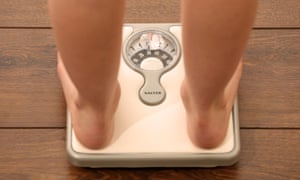There’s more to losing weight after the festive binge than cutting calories – lifestyle, psychology and setting realistic goals are also key to success
How to get in shape - and stay that wayPhotograph: Chris Radburn/PA Wire Photograph: Chris Radburn/PA

After the culinary excesses of the festive season, it is no surprise that one of the most common New Year resolutions is to lose weight. And while reaching a healthy weight can take commitment and willpower, there are some tried and tested approaches that should make the task easier.
There is no doubt that people with an optimum body weight live longer and havehealthier lives. Overweight or obese people are more likely to develop diabetes, heart disease, high blood pressure, cancer, osteoporosis, and experience fertility problems. They die younger too. Body mass index is not a perfect measure, particularly for heavy people who are lean and muscular, but it works for much of the population. The healthiest BMIs range from 22.5 to 25. When it reaches 30 to 35, life expectancy falls by two to four years. A BMI from 40 to 45 typically shortens life by eight to 10 years. Many deaths in overweight people are the result of vascular disease.

How long do people keep their New Year resolutions?
Read more
Aisling Pigott, a spokeswoman for the British Dietetic Association, says many people allow themselves to binge over Christmas on the promise that they will fast in the new year. Unsurprisingly, this is not the best way to start, she says. “People need to think about moderation all the time. Weight loss involves adjusting lifestyle, diet and calorie intake, whilst overcoming the psychological barriers too.”
Psychology is a major factor to be wrestled with, but using positive terms can help. Do not to frame the goal of losing weight in negative language, says Pigott, because that only increases the cravings. Instead of “cutting out” this food, and “never again” having that food, look forward to enjoying a healthy routine, one with boundaries on some foods. “You will feel far less hard done by,” says Pigott.
The first goal should be to stabilise eating patterns. For people who eat as and when they can, that means imposing some order, and having more consistent meal times. Having a proper meal routine helps to keep hunger under control. Once mealtimes fall into a regular pattern, look at reducing portion sizes, and how often the menu includes takeaways and treats such as cakes and chocolate. Do not see food as the enemy. “A lot of people who try to lose weight tell me they absolutely hate eating. Food becomes a stressful experience because they feel out of control,” Pigott says. “Try to enjoy it again. Turn off the television and pay attention to what’s going into your mouth.”
There is more to losing weight than cutting down on calories. Look at overall lifestyle to see what small changes can be made straight away and built on over time. But make each commitment realistic and achievable. That could mean walking or cycling to the shops one day instead of driving, hopping off the bus a stop or two early once a week, and doing without that extra portion of potatoes or pudding. Start small and then build.
The new year will see an explosion in fad diets, but Pigott warns against them all. Diets are often hard to maintain in the long run and can even lead to weight gain if people do not change their lifestyle and behaviour, she says. “For me, anything that isn’t a lifestyle change is not an appropriate weight loss strategy.”
Tim Spector, author of The Diet Myth and professor of genetic epidemiology at King’s College London, went vegetarian when he wanted to lose 10kg some years back. The move cut out nearly all processed food – gone were the bacon, sausages and frozen lasagnes. It meant he ate a wider range of fruit and vegetables and had to get inventive at meal times. That, he says, was good for his gut microbiome, the unseen community of bugs that live in our digestive tracts.
Gut microbes seem to have a bearing on bodyweight, along with plenty of other aspects of human biology, such as the immune system and even mood. In one landmark study, researchers took gut bacteria from human twins, in which one was obese and the other slim. The scientists transferred the bugs into mice and watched them grow. Mice that received gut bugs from the overweight twin grew fat, but those that received bacteria from the slim twin stayed a healthy weight.
Spector advocates eating for a diverse microbiome, and that means a good variety of vegetables. Slim people, he says, typically have a more diverse community of bugs in their guts, suggesting that some strains play a role in controlling body weight.
“The first thing is to decide what you want to lose, have some attainable goal, and kickstart the process in a feasible way,” Spector says. “There isn’t a one-size-fits-all diet.”

